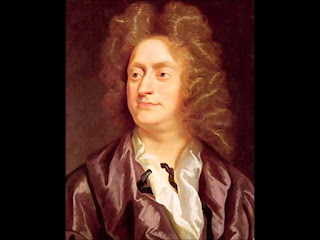Vocal Music
- Let thy blood in mercy poured – Johann Cruger (1598-1662)
Instrumental Music
- Praise to the King – Bill Ingram (contemporary)
- Riguadon – André Campra (1660-1744)
- Let Thy Blood in Mercy Poured – Johann Gottfried Walther (1684-1748)
- Rondeau from Abdelazer - Henry Purcell (1659-1695)
Congregational Music (all hymns from the Hymnal 1982 with the exception of those marked “R” which are from Renew.)
- Hymn 411 - O bless the Lord, my soul (St. Thomas (Williams))
- Hymn 605 - What does the Lord require (Sharpethorne)
- Hymn 424 - For the fruit of all creation (East Acklam)
- Hymn 301 - Bread of the world, in mercy broken (Rendez a Dieu)
- Hymn 410 - Praise, my soul, the King of heaven (Lauda anima)
- Psalm 32:1-8, Tonus Pergrinus, refrain by David Clark Isele
This Sunday, the Good Shepherd Bell Choir will ring for the first time this season. We have a great group of ringers this year, and are excited about the coming year. We will be ringing two pieces in worship. First is an original piece for bells by Texas composer
Bill Ingram. Ingram is a native of Longview, Texas and a graduate of East Texas Baptist University. He began work as a minister of music in 1963 and served several Baptist churches in Texarkana, Dallas, and Pasadena, (all Texas) before residing in Baytown, Texas.
Now Ingram is a freelance composer and arranger and serves as handbell editor for two different publishers. He often serves churches in the Houston area as interim Minister of Music.
Mr. Ingram says, “I began writing for hand bells when we purchased bells at First Baptist Church, Baytown in 1975. My first compositions and arrangements were probably published in 1976. I have over 650 arrangements and compositions in print." In 1996, Jeffers Handbell Supply honored him as the “Composer of the Year” when “Do Lord” was the best seller that year.
The other piece we will play is an arrangement of the French baroque composer
André Campra's Rigaudon from his opera
Idoménée. Arguably his most familiar work, it is most often used as a wedding processional. It is in the form of a
rondo, a work ,with one principal musical theme that is stated at least three times in the same key and to which return is made after the introduction of each subordinate theme.
 |
Andre Campra. His hair was not
all he had in common with Henry Purcell |
The most significant composer for the French stage between Lully and Rameau, Campra had his beginnings as a church musician. His father, an amateur violinist, provided him with his first music lessons, and at age 14 he joined the choir of St. Sauveur. At one point he nearly lost his place in the choir when he was caught giving unauthorized performances in secular theaters on the side. In August of 1681 he became the director of music at the church of Ste. Trophime in Arles, and two years later moved on to the same position at the Cathedral of St. Étienne in Toulouse. In 1694 he became choir master at Notre Dame. Until he arrived in Paris he had composed mostly sacred music, but even though he had reached a top position in the world of church music, the dramatic stage once again began to draw his creativity.
He began writing a new form of entertainment, the opéra-ballet, which he had published in his younger brother's name because he was afraid of losing his church appointment. His first three works were so successful, however, that he became confident in his ability to support himself with secular music. In 1700, he left Notre Dame and wrote his first of eight operas. Of these, only
Tancrède (1702) and
Idomenée (1712) have been performed with any regularity in the twentieth century.

The closing voluntary is an organ arrangement of a
Rondeau by Henry Purcell. (Note the French spelling of the word
Rondo.) The similarity of our handbell offertory by Campra and the organ voluntary is more than just the musical form, however. Both are arrangements of popular tunes from theatrical works by leading composers of the same time period.
The
Rondeau is
from the incidental music that
Henry Purcell composed for the play
Abdelazer, or the Moor's Revenge. One of Purcell’s last works, the play was staged in 1695, the year of Purcell's death. The Rondeau’s place in history was assured when the composer Benjamin Britten chose it for his
Young Person's Guide to the Orchestra: Variations and Fugue on a Theme of Purcell (1946).
The choir will sing the four part hymn by Johann Cruger,
Let Thy Blood in Mercy Poured, as the communion motet. This is one of the top five hymns by Cruger, whose other hymns are much better known to modern worshippers.
- Ah, Holy Jesus, How Hast Thou Offended
- Soul, Adorn Yourself with Gladness
- Jesus, Priceless Treasure
- Let Thy Blood in Mercy Poured
Cruger was the son of an innkeeper, born at Gross-Bressen, near Guben in Prussia. He studied theology at the University of Wittenberg but left early to be the cantor of St. Nicholas Church in Berlin and to teach at the Gymnasium of the Grey Friars.
A friend of Paul Gerhardt, Cruger composed melodies for many hymns by Gerhardt and others. He composed seventy-one sacred chorales and also created elaborate instrumental accompaniments for hymns, actively promoting congregational singing. He was also a musicologist and wrote about the theory and practice of music. His hymnals also included other famous tunes such as
Praise to the Lord, the Almighty and
O Sacred Head, Now Wounded.
I will follow the choir's singing of the hymn with an organ work based on the same hymn by the contemporary of J. S. Bach, the German organist Johann Gottlieb Walther.










